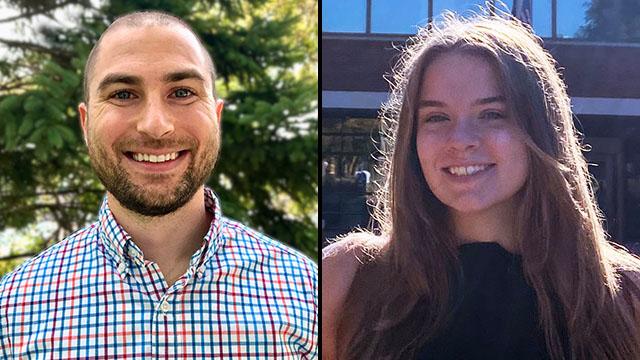Students who attend the Humphrey School of Public Affairs are after more than just a degree – they want to change the world.
That’s certainly true for students in the School’s science, technology, and environmental policy (STEP) area, who are passionate about addressing the climate crisis.
Alongside the coursework that’s required to complete their degree, students have many opportunities provided by the Humphrey School and the University as a whole to make an impact.
Thanks in part to the Swain Climate Policy Initiative, which was launched at the Humphrey School in 2021, those students have even more resources to support their initiatives.
Take Eric Barry and Katie Murphy, for example. They both graduated in May with their master’s degrees in STEP. They took full advantage of their time at the University, using various channels to encourage others on campus to get involved in addressing climate change.
- Barry and Murphy were leaders in two student groups: the Humphrey School’s Energy and Environmental Policy Club (EEPC), and the West Bank Energy and Environment Collaborative (WBEEC), which includes students from the Humphrey, Carlson, and Law schools.
- With support from a Swain student grant, they organized a variety of on-campus activities during Earth Week this past April, including a ‘Climate Change Challenge’ where teams competed to come up with solutions to real climate issues on campus; and a series of ‘Climate Action Breakfast Briefings’ to review and discuss recent climate change developments.
- They hosted a conference with the West Bank Collaborative to examine climate change from a rural perspective. Barry and Murphy were recognized for this effort with the Edward Burdick Legislative Award, which honors student work that “exemplifies bipartisanship or forges bipartisan relationships.”
“One of the main ways students can grapple with climate change outside of the classroom and lab is to get involved with groups like these,” said Barry. “These clubs allowed us to work with people who have diverse perspectives and bring in outside voices, especially on rural climate issues.”
The Swain impact
The Swain Climate Policy Initiative kicked off last October with a weeklong series of events designed to encourage action on campus, especially among students. And it worked, Murphy said.
“The launch of the Swain project spurred a lot of collaboration and better communication among student groups across the University,” she said. “We got to know more people and brought in more perspectives.”
In addition to their on-campus activities, both Barry and Murphy attended the UN’s global climate conference, called COP26, in Glasgow, Scotland, last fall, along with about two dozen other UMN representatives. As part of its focus to empower students in climate action, the Swain fund awarded travel grants to nine Humphrey School students so they could attend the conference.
Going forward, the Swain Initiative will continue to support student activities and research, along with events and collaborations for the general public – all with the goal of engaging and energizing Minnesotans to become part of the solution to climate change through policy and advocacy.
Next steps
As for Barry and Murphy, now that they’ve graduated they plan to continue working toward climate solutions long term.
Murphy’s interests lie in food systems and sustainable agriculture. Last year she worked on a project to develop a model internship program for first-time farmers in Minnesota, to help them adopt sustainable practices. She’s also a research assistant for Associate Professor Bonnie Keeler.
Barry has been active in renewable energy, studying energy transitions and electric cooperatives as a graduate researcher, learning about solar development as an intern at National Grid Renewables, and engaging with communities as a board member of a Minnesota energy nonprofit organization. Moving forward, he hopes to continue his work on electrification and decarbonization in Minnesota and beyond.
“I’ve been energized by the STEP program at the Humphrey School,” Barry said. “I found a home here in the content, the research, the ideas, and the work that’s being done. It’s been inspiring, and I plan to continue this as my new career path.”
STEP faculty members Bonnie Keeler and Gabe Chan are continuing to expand research and outreach efforts with a relaunch this fall of the Center for Science, Technology, and Environmental Policy, with support from the Swain Initiative. The Center will apply community-engaged research to address socio-economic inequality, and prepare future leaders in the energy, environmental, and policy arenas.


